AHS205: Assessment 2 - Analysis of Healthcare Policy and Stakeholders
VerifiedAdded on 2022/12/14
|7
|1792
|68
Report
AI Summary
This report examines the National Strategic Framework for Chronic Conditions, a key Australian healthcare policy aimed at improving the lives of individuals with chronic illnesses. It identifies the major stakeholders influencing the policy, including government bodies, healthcare professionals, and community members. The report analyzes current challenges within the health service sector, such as information integration and data security, and how the framework addresses these issues. Furthermore, it explores the policy's impact on social determinants of health, including access to care for individuals with disabilities and those in aged care facilities. The report concludes by emphasizing the framework's role in providing guidance and promoting healthier lives through effective prevention and management of chronic conditions, with a focus on government's role in ensuring safety and security of patient information.
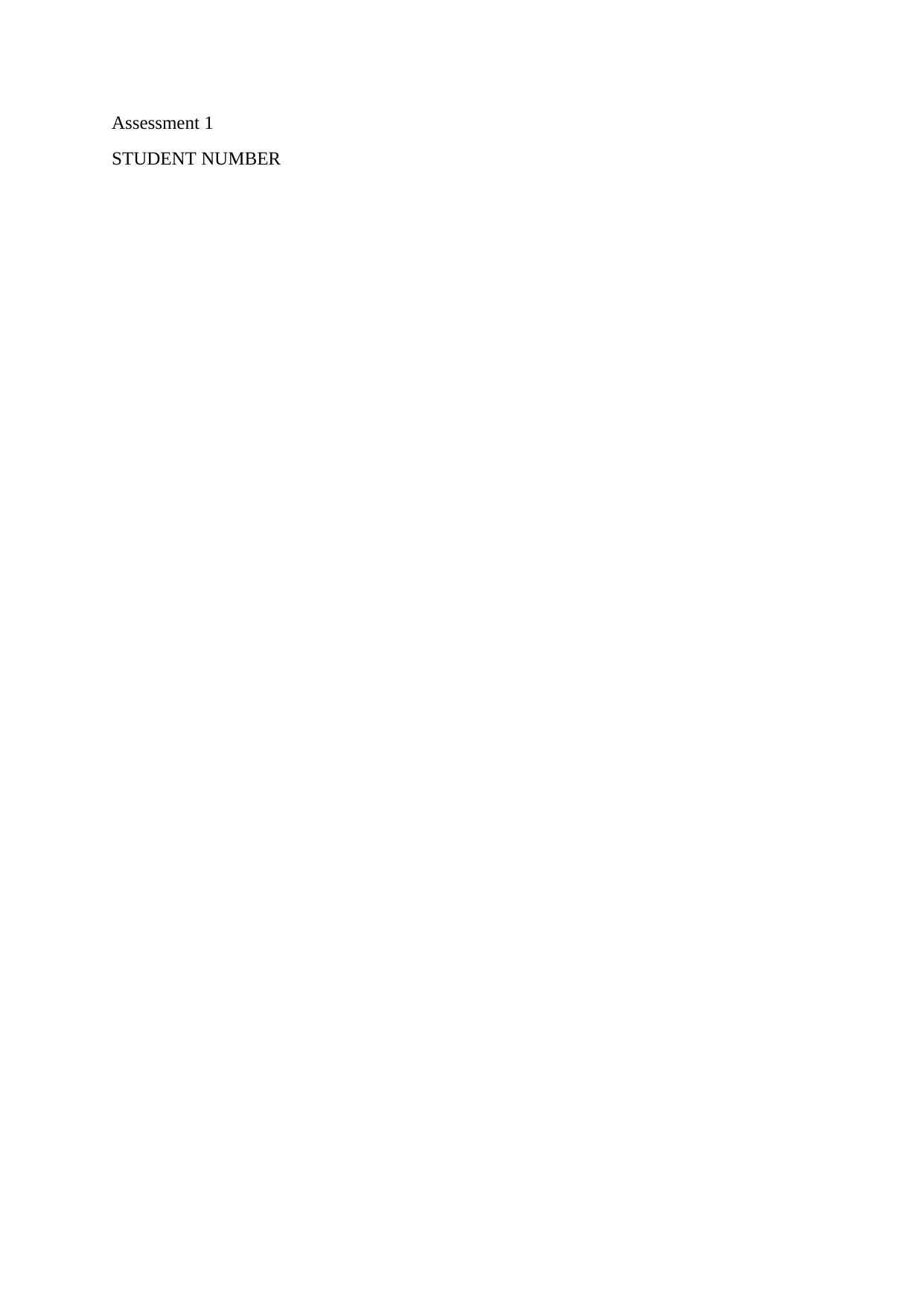
Assessment 1
STUDENT NUMBER
STUDENT NUMBER
Paraphrase This Document
Need a fresh take? Get an instant paraphrase of this document with our AI Paraphraser
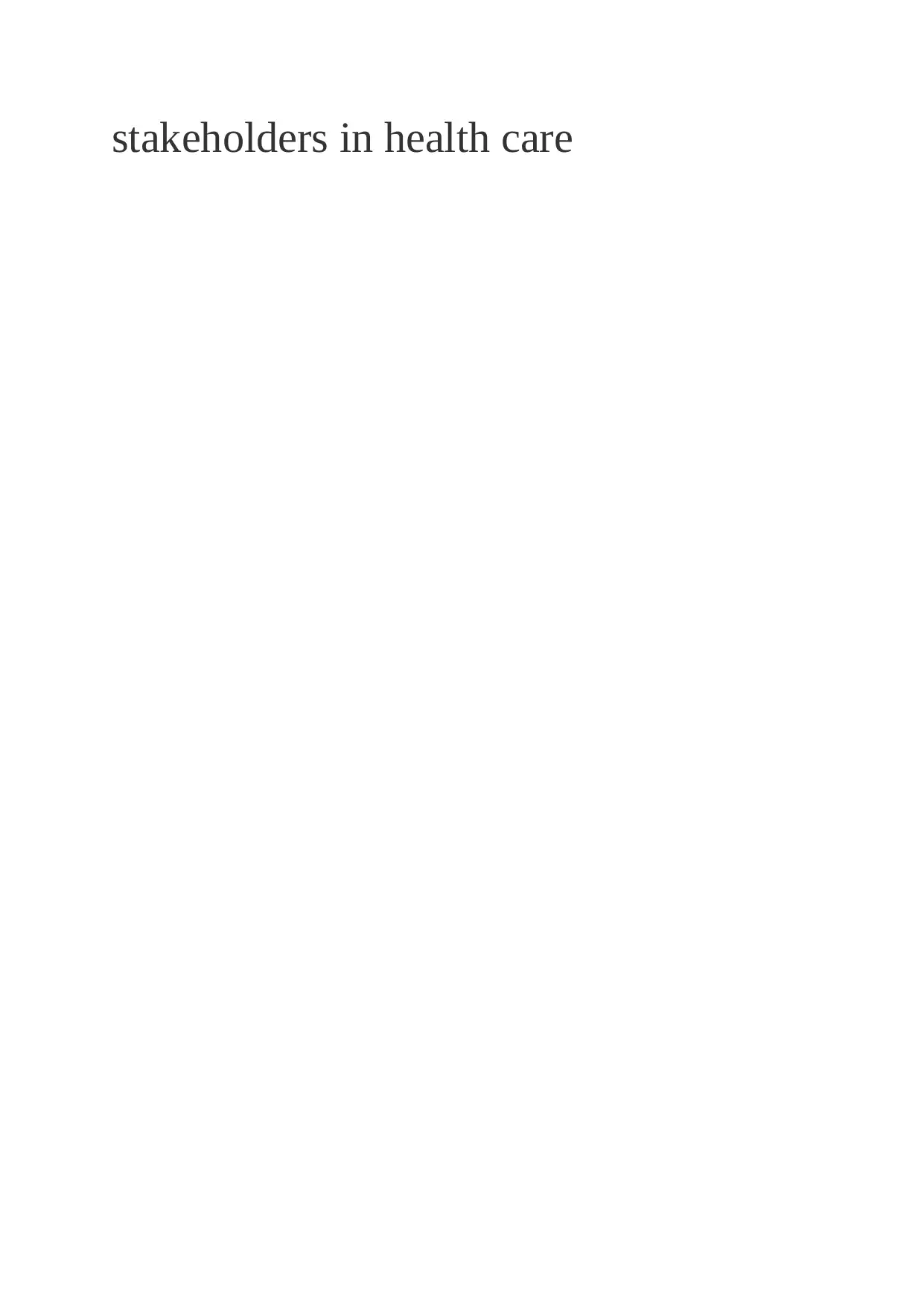
stakeholders in health care
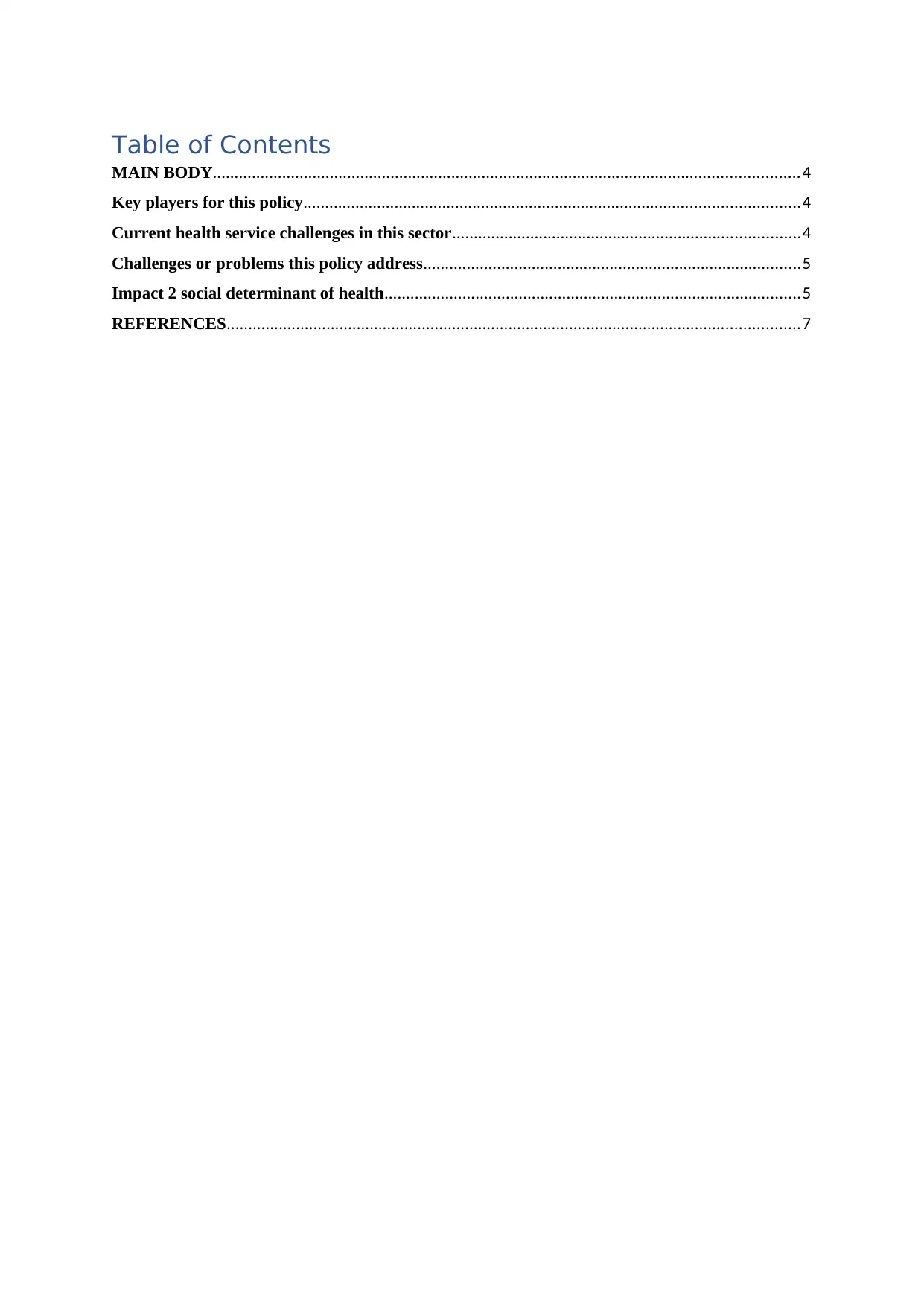
Table of Contents
MAIN BODY.......................................................................................................................................4
Key players for this policy..................................................................................................................4
Current health service challenges in this sector................................................................................4
Challenges or problems this policy address.......................................................................................5
Impact 2 social determinant of health................................................................................................5
REFERENCES....................................................................................................................................7
MAIN BODY.......................................................................................................................................4
Key players for this policy..................................................................................................................4
Current health service challenges in this sector................................................................................4
Challenges or problems this policy address.......................................................................................5
Impact 2 social determinant of health................................................................................................5
REFERENCES....................................................................................................................................7
⊘ This is a preview!⊘
Do you want full access?
Subscribe today to unlock all pages.

Trusted by 1+ million students worldwide
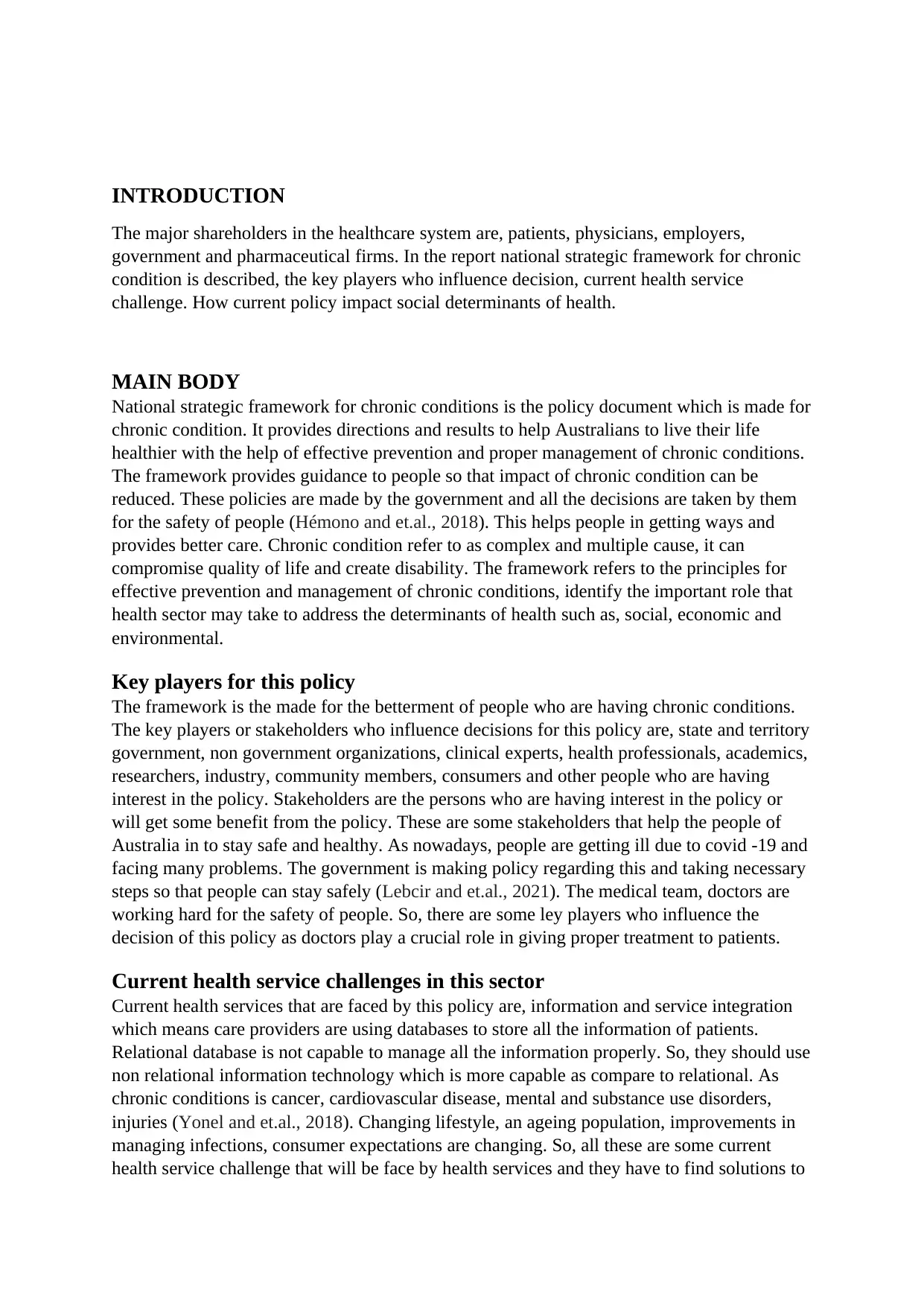
INTRODUCTION
The major shareholders in the healthcare system are, patients, physicians, employers,
government and pharmaceutical firms. In the report national strategic framework for chronic
condition is described, the key players who influence decision, current health service
challenge. How current policy impact social determinants of health.
MAIN BODY
National strategic framework for chronic conditions is the policy document which is made for
chronic condition. It provides directions and results to help Australians to live their life
healthier with the help of effective prevention and proper management of chronic conditions.
The framework provides guidance to people so that impact of chronic condition can be
reduced. These policies are made by the government and all the decisions are taken by them
for the safety of people (Hémono and et.al., 2018). This helps people in getting ways and
provides better care. Chronic condition refer to as complex and multiple cause, it can
compromise quality of life and create disability. The framework refers to the principles for
effective prevention and management of chronic conditions, identify the important role that
health sector may take to address the determinants of health such as, social, economic and
environmental.
Key players for this policy
The framework is the made for the betterment of people who are having chronic conditions.
The key players or stakeholders who influence decisions for this policy are, state and territory
government, non government organizations, clinical experts, health professionals, academics,
researchers, industry, community members, consumers and other people who are having
interest in the policy. Stakeholders are the persons who are having interest in the policy or
will get some benefit from the policy. These are some stakeholders that help the people of
Australia in to stay safe and healthy. As nowadays, people are getting ill due to covid -19 and
facing many problems. The government is making policy regarding this and taking necessary
steps so that people can stay safely (Lebcir and et.al., 2021). The medical team, doctors are
working hard for the safety of people. So, there are some ley players who influence the
decision of this policy as doctors play a crucial role in giving proper treatment to patients.
Current health service challenges in this sector
Current health services that are faced by this policy are, information and service integration
which means care providers are using databases to store all the information of patients.
Relational database is not capable to manage all the information properly. So, they should use
non relational information technology which is more capable as compare to relational. As
chronic conditions is cancer, cardiovascular disease, mental and substance use disorders,
injuries (Yonel and et.al., 2018). Changing lifestyle, an ageing population, improvements in
managing infections, consumer expectations are changing. So, all these are some current
health service challenge that will be face by health services and they have to find solutions to
The major shareholders in the healthcare system are, patients, physicians, employers,
government and pharmaceutical firms. In the report national strategic framework for chronic
condition is described, the key players who influence decision, current health service
challenge. How current policy impact social determinants of health.
MAIN BODY
National strategic framework for chronic conditions is the policy document which is made for
chronic condition. It provides directions and results to help Australians to live their life
healthier with the help of effective prevention and proper management of chronic conditions.
The framework provides guidance to people so that impact of chronic condition can be
reduced. These policies are made by the government and all the decisions are taken by them
for the safety of people (Hémono and et.al., 2018). This helps people in getting ways and
provides better care. Chronic condition refer to as complex and multiple cause, it can
compromise quality of life and create disability. The framework refers to the principles for
effective prevention and management of chronic conditions, identify the important role that
health sector may take to address the determinants of health such as, social, economic and
environmental.
Key players for this policy
The framework is the made for the betterment of people who are having chronic conditions.
The key players or stakeholders who influence decisions for this policy are, state and territory
government, non government organizations, clinical experts, health professionals, academics,
researchers, industry, community members, consumers and other people who are having
interest in the policy. Stakeholders are the persons who are having interest in the policy or
will get some benefit from the policy. These are some stakeholders that help the people of
Australia in to stay safe and healthy. As nowadays, people are getting ill due to covid -19 and
facing many problems. The government is making policy regarding this and taking necessary
steps so that people can stay safely (Lebcir and et.al., 2021). The medical team, doctors are
working hard for the safety of people. So, there are some ley players who influence the
decision of this policy as doctors play a crucial role in giving proper treatment to patients.
Current health service challenges in this sector
Current health services that are faced by this policy are, information and service integration
which means care providers are using databases to store all the information of patients.
Relational database is not capable to manage all the information properly. So, they should use
non relational information technology which is more capable as compare to relational. As
chronic conditions is cancer, cardiovascular disease, mental and substance use disorders,
injuries (Yonel and et.al., 2018). Changing lifestyle, an ageing population, improvements in
managing infections, consumer expectations are changing. So, all these are some current
health service challenge that will be face by health services and they have to find solutions to
Paraphrase This Document
Need a fresh take? Get an instant paraphrase of this document with our AI Paraphraser
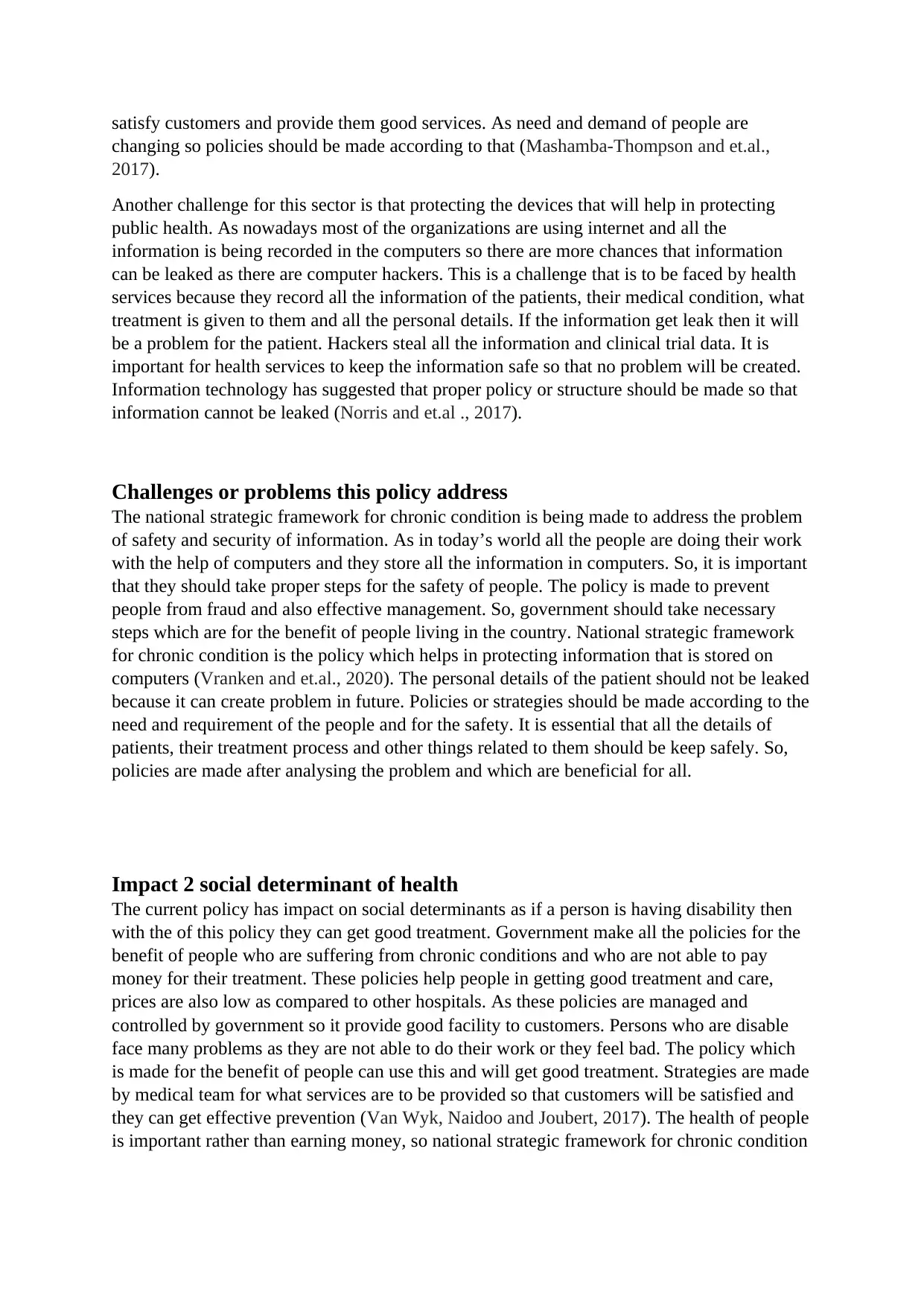
satisfy customers and provide them good services. As need and demand of people are
changing so policies should be made according to that (Mashamba-Thompson and et.al.,
2017).
Another challenge for this sector is that protecting the devices that will help in protecting
public health. As nowadays most of the organizations are using internet and all the
information is being recorded in the computers so there are more chances that information
can be leaked as there are computer hackers. This is a challenge that is to be faced by health
services because they record all the information of the patients, their medical condition, what
treatment is given to them and all the personal details. If the information get leak then it will
be a problem for the patient. Hackers steal all the information and clinical trial data. It is
important for health services to keep the information safe so that no problem will be created.
Information technology has suggested that proper policy or structure should be made so that
information cannot be leaked (Norris and et.al ., 2017).
Challenges or problems this policy address
The national strategic framework for chronic condition is being made to address the problem
of safety and security of information. As in today’s world all the people are doing their work
with the help of computers and they store all the information in computers. So, it is important
that they should take proper steps for the safety of people. The policy is made to prevent
people from fraud and also effective management. So, government should take necessary
steps which are for the benefit of people living in the country. National strategic framework
for chronic condition is the policy which helps in protecting information that is stored on
computers (Vranken and et.al., 2020). The personal details of the patient should not be leaked
because it can create problem in future. Policies or strategies should be made according to the
need and requirement of the people and for the safety. It is essential that all the details of
patients, their treatment process and other things related to them should be keep safely. So,
policies are made after analysing the problem and which are beneficial for all.
Impact 2 social determinant of health
The current policy has impact on social determinants as if a person is having disability then
with the of this policy they can get good treatment. Government make all the policies for the
benefit of people who are suffering from chronic conditions and who are not able to pay
money for their treatment. These policies help people in getting good treatment and care,
prices are also low as compared to other hospitals. As these policies are managed and
controlled by government so it provide good facility to customers. Persons who are disable
face many problems as they are not able to do their work or they feel bad. The policy which
is made for the benefit of people can use this and will get good treatment. Strategies are made
by medical team for what services are to be provided so that customers will be satisfied and
they can get effective prevention (Van Wyk, Naidoo and Joubert, 2017). The health of people
is important rather than earning money, so national strategic framework for chronic condition
changing so policies should be made according to that (Mashamba-Thompson and et.al.,
2017).
Another challenge for this sector is that protecting the devices that will help in protecting
public health. As nowadays most of the organizations are using internet and all the
information is being recorded in the computers so there are more chances that information
can be leaked as there are computer hackers. This is a challenge that is to be faced by health
services because they record all the information of the patients, their medical condition, what
treatment is given to them and all the personal details. If the information get leak then it will
be a problem for the patient. Hackers steal all the information and clinical trial data. It is
important for health services to keep the information safe so that no problem will be created.
Information technology has suggested that proper policy or structure should be made so that
information cannot be leaked (Norris and et.al ., 2017).
Challenges or problems this policy address
The national strategic framework for chronic condition is being made to address the problem
of safety and security of information. As in today’s world all the people are doing their work
with the help of computers and they store all the information in computers. So, it is important
that they should take proper steps for the safety of people. The policy is made to prevent
people from fraud and also effective management. So, government should take necessary
steps which are for the benefit of people living in the country. National strategic framework
for chronic condition is the policy which helps in protecting information that is stored on
computers (Vranken and et.al., 2020). The personal details of the patient should not be leaked
because it can create problem in future. Policies or strategies should be made according to the
need and requirement of the people and for the safety. It is essential that all the details of
patients, their treatment process and other things related to them should be keep safely. So,
policies are made after analysing the problem and which are beneficial for all.
Impact 2 social determinant of health
The current policy has impact on social determinants as if a person is having disability then
with the of this policy they can get good treatment. Government make all the policies for the
benefit of people who are suffering from chronic conditions and who are not able to pay
money for their treatment. These policies help people in getting good treatment and care,
prices are also low as compared to other hospitals. As these policies are managed and
controlled by government so it provide good facility to customers. Persons who are disable
face many problems as they are not able to do their work or they feel bad. The policy which
is made for the benefit of people can use this and will get good treatment. Strategies are made
by medical team for what services are to be provided so that customers will be satisfied and
they can get effective prevention (Van Wyk, Naidoo and Joubert, 2017). The health of people
is important rather than earning money, so national strategic framework for chronic condition
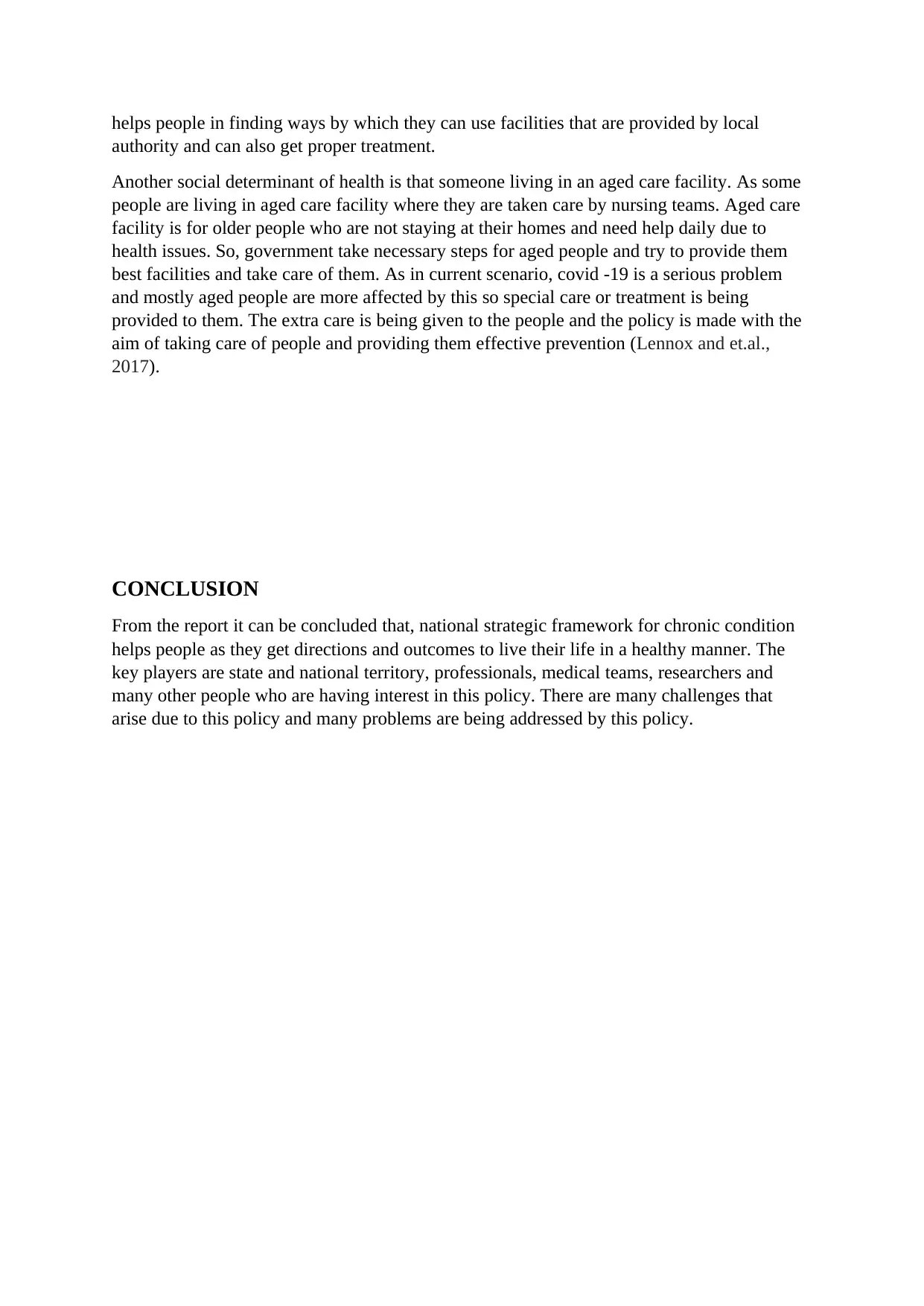
helps people in finding ways by which they can use facilities that are provided by local
authority and can also get proper treatment.
Another social determinant of health is that someone living in an aged care facility. As some
people are living in aged care facility where they are taken care by nursing teams. Aged care
facility is for older people who are not staying at their homes and need help daily due to
health issues. So, government take necessary steps for aged people and try to provide them
best facilities and take care of them. As in current scenario, covid -19 is a serious problem
and mostly aged people are more affected by this so special care or treatment is being
provided to them. The extra care is being given to the people and the policy is made with the
aim of taking care of people and providing them effective prevention (Lennox and et.al.,
2017).
CONCLUSION
From the report it can be concluded that, national strategic framework for chronic condition
helps people as they get directions and outcomes to live their life in a healthy manner. The
key players are state and national territory, professionals, medical teams, researchers and
many other people who are having interest in this policy. There are many challenges that
arise due to this policy and many problems are being addressed by this policy.
authority and can also get proper treatment.
Another social determinant of health is that someone living in an aged care facility. As some
people are living in aged care facility where they are taken care by nursing teams. Aged care
facility is for older people who are not staying at their homes and need help daily due to
health issues. So, government take necessary steps for aged people and try to provide them
best facilities and take care of them. As in current scenario, covid -19 is a serious problem
and mostly aged people are more affected by this so special care or treatment is being
provided to them. The extra care is being given to the people and the policy is made with the
aim of taking care of people and providing them effective prevention (Lennox and et.al.,
2017).
CONCLUSION
From the report it can be concluded that, national strategic framework for chronic condition
helps people as they get directions and outcomes to live their life in a healthy manner. The
key players are state and national territory, professionals, medical teams, researchers and
many other people who are having interest in this policy. There are many challenges that
arise due to this policy and many problems are being addressed by this policy.
⊘ This is a preview!⊘
Do you want full access?
Subscribe today to unlock all pages.

Trusted by 1+ million students worldwide
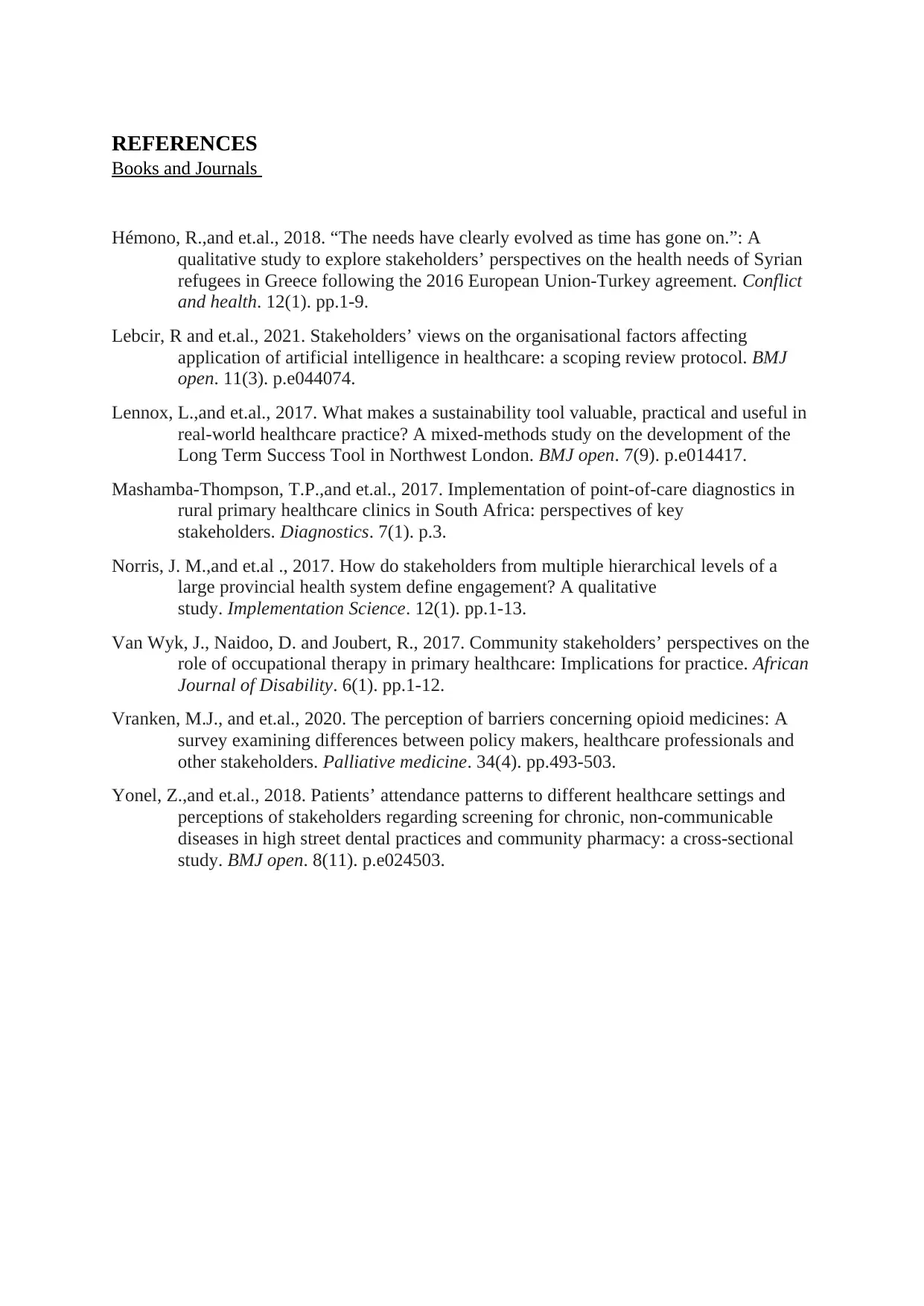
REFERENCES
Books and Journals
Hémono, R.,and et.al., 2018. “The needs have clearly evolved as time has gone on.”: A
qualitative study to explore stakeholders’ perspectives on the health needs of Syrian
refugees in Greece following the 2016 European Union-Turkey agreement. Conflict
and health. 12(1). pp.1-9.
Lebcir, R and et.al., 2021. Stakeholders’ views on the organisational factors affecting
application of artificial intelligence in healthcare: a scoping review protocol. BMJ
open. 11(3). p.e044074.
Lennox, L.,and et.al., 2017. What makes a sustainability tool valuable, practical and useful in
real-world healthcare practice? A mixed-methods study on the development of the
Long Term Success Tool in Northwest London. BMJ open. 7(9). p.e014417.
Mashamba-Thompson, T.P.,and et.al., 2017. Implementation of point-of-care diagnostics in
rural primary healthcare clinics in South Africa: perspectives of key
stakeholders. Diagnostics. 7(1). p.3.
Norris, J. M.,and et.al ., 2017. How do stakeholders from multiple hierarchical levels of a
large provincial health system define engagement? A qualitative
study. Implementation Science. 12(1). pp.1-13.
Van Wyk, J., Naidoo, D. and Joubert, R., 2017. Community stakeholders’ perspectives on the
role of occupational therapy in primary healthcare: Implications for practice. African
Journal of Disability. 6(1). pp.1-12.
Vranken, M.J., and et.al., 2020. The perception of barriers concerning opioid medicines: A
survey examining differences between policy makers, healthcare professionals and
other stakeholders. Palliative medicine. 34(4). pp.493-503.
Yonel, Z.,and et.al., 2018. Patients’ attendance patterns to different healthcare settings and
perceptions of stakeholders regarding screening for chronic, non-communicable
diseases in high street dental practices and community pharmacy: a cross-sectional
study. BMJ open. 8(11). p.e024503.
Books and Journals
Hémono, R.,and et.al., 2018. “The needs have clearly evolved as time has gone on.”: A
qualitative study to explore stakeholders’ perspectives on the health needs of Syrian
refugees in Greece following the 2016 European Union-Turkey agreement. Conflict
and health. 12(1). pp.1-9.
Lebcir, R and et.al., 2021. Stakeholders’ views on the organisational factors affecting
application of artificial intelligence in healthcare: a scoping review protocol. BMJ
open. 11(3). p.e044074.
Lennox, L.,and et.al., 2017. What makes a sustainability tool valuable, practical and useful in
real-world healthcare practice? A mixed-methods study on the development of the
Long Term Success Tool in Northwest London. BMJ open. 7(9). p.e014417.
Mashamba-Thompson, T.P.,and et.al., 2017. Implementation of point-of-care diagnostics in
rural primary healthcare clinics in South Africa: perspectives of key
stakeholders. Diagnostics. 7(1). p.3.
Norris, J. M.,and et.al ., 2017. How do stakeholders from multiple hierarchical levels of a
large provincial health system define engagement? A qualitative
study. Implementation Science. 12(1). pp.1-13.
Van Wyk, J., Naidoo, D. and Joubert, R., 2017. Community stakeholders’ perspectives on the
role of occupational therapy in primary healthcare: Implications for practice. African
Journal of Disability. 6(1). pp.1-12.
Vranken, M.J., and et.al., 2020. The perception of barriers concerning opioid medicines: A
survey examining differences between policy makers, healthcare professionals and
other stakeholders. Palliative medicine. 34(4). pp.493-503.
Yonel, Z.,and et.al., 2018. Patients’ attendance patterns to different healthcare settings and
perceptions of stakeholders regarding screening for chronic, non-communicable
diseases in high street dental practices and community pharmacy: a cross-sectional
study. BMJ open. 8(11). p.e024503.
1 out of 7
Related Documents
Your All-in-One AI-Powered Toolkit for Academic Success.
+13062052269
info@desklib.com
Available 24*7 on WhatsApp / Email
![[object Object]](/_next/static/media/star-bottom.7253800d.svg)
Unlock your academic potential
Copyright © 2020–2026 A2Z Services. All Rights Reserved. Developed and managed by ZUCOL.




